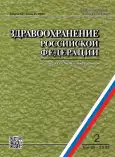Healthcare in Dagestan during the Great Patriotic War
- Authors: Manyshev S.B.1, Manysheva K.B.2
-
Affiliations:
- High School of Economics-University
- Dagestan State Medical University
- Issue: Vol 69, No 2 (2025)
- Pages: 182-186
- Section: HISTORY OF HEALTH CARE AND MEDICINE
- Submitted: 26.05.2025
- URL: https://vestnik.nvsu.ru/0044-197X/article/view/680577
- DOI: https://doi.org/10.47470/0044-197X-2025-69-2-182-186
- EDN: https://elibrary.ru/ypwals
- ID: 680577
Cite item
Abstract
The article examines specific features of the medical service in Dagestan during the Great Patriotic War based on a wide range of published and newly introduced documents. The health care system in Dagestan suffered from serious changes during the significant events in the Soviet history, which had an essential impact on the state of the medical service in the region. The authors examine the specifics of the transformations in the field of managing care to the military and civilian population. Dagestan was a deep rear area at the beginning of the war, so evacuation hospitals were established here, its workload increased as the front line approached, and as a result, the work of hospitals consisted of serving the seriously wounded combatants moving from sanitary trains from the front and from other hospitals which were in the frontline or in enemy-occupied territory. According to mobilization in this period, Dagestan suffered from an acute shortage of qualified medical personnel, diagnostic equipment, care products, instruments and medications. For this reason, the medical service extra suffered in rural areas, and the system of emergency and urgent care to the civilian population was almost destroyed throughout the region. The article pays specific attention to the scientific work conducted by medical workers during the war. The authors conclude that Dagestan was characterized by trends in the transformation of the health care system of the entire country, and the imbalance in providing medical care exclusively to wounded combatants led to a deterioration in the quality of medical care for the civilian population.Contribution of the authors. All co-authors made an equal contribution to the research and preparation of the article for publication.Acknowledgement. The study was carried out within the framework of the Fundamental Research Program of the National Research University “Higher School of Economics”.Conflict of interest. The authors declare no conflict of interest.Received: September 11, 2024 / Revised: November 29, 2024 / Accepted: December 11, 2024 / Published: April 30, 2025
About the authors
Sergey B. Manyshev
High School of Economics-University
Email: msergey1990@gmail.com
Kseniia B. Manysheva
Dagestan State Medical University
Email: manyshevakb@gmail.com
References
- Аликишиев Р.Ш. Очерки по истории здравоохранения Дагестана. М.: Медгиз; 1958.
- Чучелин Г.А. Партийные организации Северного Кавказа во главе движения за оказание помощи раненым воинам. В кн.: Куманев Г.А., ред. Народный подвиг в битве за Кавказ. М.: Наука; 1981: 327–35.
- Федченко Е.В. Медицинские учреждения Северного Кавказа в годы Великой Отечественной войны (1941–1945 гг.). В кн.: Иванов Г.П., ред. Из истории трудового подвига народов Северного Кавказа в годы Великой Отечественной войны. Краснодар; 1985: 143–8.
- Ананьева Е.С. Медицинские учреждения Дагестана в годы Великой Отечественной войны. В кн.: Каймаразов Г.Ш., ред. Годы суровых испытаний и народного подвига. Махачкала; 1995: 134–47.
- Нагиева М.К. Организация госпиталей в Дагестане в годы Великой Отечественной войны. Вестник Дагестанского научного центра РАН. 2015; (58): 92–5. https://elibrary.ru/wckbvd
- Бутаев М.Д., Гасанов Ш.Г., Джамбулатова Р.И., Какагасанов Г.И. Дагестан в годы Великой Отечественной войны (1941–1945 гг.). Махачкала; 1995.
- Какагасанов Г.И., Бутаев М.Д., Джамбулатова Р.И., Чекулаев Н.Д. Народы Дагестана в годы Великой Отечественной войны (1941–1945 гг.). Махачкала; 2005.
- Гаценко В.М. Эвакогоспитали Северного Кавказа в первый год Великой Отечественной войны. Военно-медицинский журнал. 1971; (11): 90–1.
- Блюмфельд О., Кичев М., Мелешко А. Дагестан в годы Великой Отечественной войны: Воспоминания участников событий. Махачкала; 1962.
- Мирзабеков М.Я., Ананьева Е.С., Юнаева В.Д. Культура дагестанского города XX в. Махачкала; 2007. https://elibrary.ru/rvhpjp
- Нагиева М.К. История развития здравоохранения в Дагестане в XX в. Том I (1900 – июнь 1941 гг.). Махачкала; 2015.
- Магомедов Ш.М., ред. Культурное строительство в Дагестанской АССР. Том 2: 1941–1977. Махачкала; 1988.
- Мирзабеков М.Я. Культура дагестанского села. XX век: история, проблемы. Махачкала: Бари; 1998.
- Какагасанов Г.И., Нагиева М.К., Чекулаев Н.Д. Роль России в экономическом и культурном развитии Дагестана (1921–1990 гг.). Махачкала: АЛЕФ; 2011.
Supplementary files






